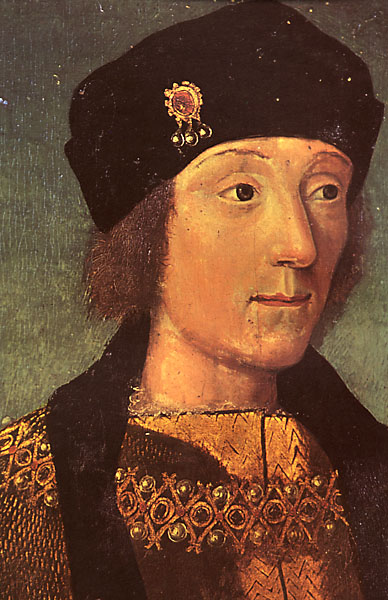As mentioned in class, our lovely writer of Morte de Arthur fought in the wars of the Roses, which was fought between the Lancasters and the Yorks.
As with all wars, its origins are complicated but this was a family war. Both sides made their claims for the throne descendants of the sons of Edward III. The man originally fought against in the beginning of the wars was Henry VI. He was married to a power-hungry French woman, his just as ambitious council mainly ruled for him and he was prone to fits of madness. Not the most stable king, a York rebellion set out to at least put his ambitious wife back in line after Henry temporarily returned to stability which lead to a victory for York but did not last for long. Eventually, the queen, Margaret of Anjou, gathered an army to prepare to attack the York's. The York's anticipate her and are able to depose Henry and install Edward IV as king.
Edward also comes with, what the English come to believe anyway, a very problematic wife, Elizabeth Woodville. Elizabeth is a problem for several reasons: 1) she's almost a commner/very low level gentry at best 2) she is ambitious 3) her mother was best friends with the previous queen, Margaret of Anjou 4) her mother was considered a witch 5) she herself was considered a witch. These last two reasons were the Lancastrian (as well as the Kingmaker's, Richard of Warwick and eventually York supporters) opinions for how she 1) managed to marry Edward and 2) how she managed to give herself and her family so much power.
Obviously this means another king must be deposed and order restored to the English court.
This is a task that takes a lot longer than removing Henry VI and ultimately ends up with the Kingmaker dead but Edward managing to live until the end of his reign. Fighting began again when Edward's brother, Richard III denied his young nephew and Edward's heir the throne ultimately leading to Lancastrian victory. This victory installs Henry Tudor, Henry VII, as King and brings peace by Elizabeth agreeing to marry her oldest child and daughter (also named Elizabeth) to Henry to bring both the families together to end the war.
The wars were named long after they had ended and were named for the color of the roses that represented each of the houses at war:
York = White Rose
Lancaster = Red Rose
Although, thinking about it now, it seems that the wars were partly due in part because the queens for both Henry VI and Richard IV were ambitious women who wanted to be involved with politics. Of course, in this time period women would not have been allowed to. Perhaps a very small part, but I would like to know what you all think about what the real causes of the wars were besides bad government and ambitious women.
(Source: Britannica)


War is something that can not be avoided no matter what time period you look at it seems to be human nature over a big dispute. War can be interpreted in many ways to ways to what actually started it but only the two sides knows what its actually about. The common people are just drug into the dispute.
ReplyDelete